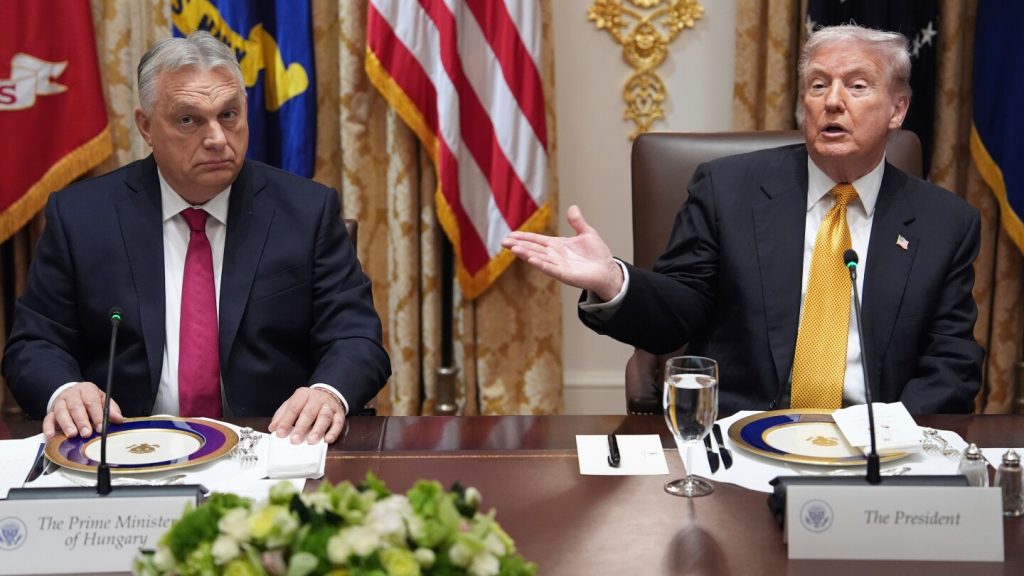Listen to the article
Hungary Secures Exemption from U.S. Sanctions on Russian Energy
Hungarian Prime Minister Viktor Orbán announced that Hungary has received a one-year exemption from U.S. sanctions on Russian energy following his meeting with President Donald Trump at the White House. This special allowance will permit Hungary to continue importing Russian oil and gas, highlighting the close relationship between the two leaders.
Orbán, a longtime Trump ally, traveled to Washington specifically to persuade the president to shield Hungary from sanctions the Trump administration had placed on Russian fossil fuels. According to a White House official speaking on condition of anonymity, the exemption will last for one year.
The nationalist Hungarian leader has described access to Russian energy as “vital” for his landlocked country and sought to discuss with Trump the potential consequences for Hungarian citizens if sanctions were fully implemented.
“We asked the president to lift the sanctions,” Orbán told Hungarian media following the talks. “We agreed and the president decided, and he said that the sanctions will not be applied to these two pipelines.” The exemption specifically covers Russian gas delivered to Hungary via the TurkStream pipeline and oil from the Druzhba pipeline.
This exemption puts Hungary at odds with broader European Union policy. Most EU member states have significantly reduced or completely eliminated their imports of Russian oil and gas since Russia’s invasion of Ukraine, and the bloc has been pressuring Hungary to follow suit.
As part of the negotiations, Hungary agreed to purchase American liquefied natural gas (LNG), with contracts expected to be worth approximately $600 million, according to a State Department fact sheet. The two countries also committed to cooperation on nuclear energy projects, including the development of small modular reactors.
Additionally, Hungary will procure nuclear fuel from the U.S.-based Westinghouse Electric Company for its Paks nuclear plant, which has historically relied on Russian-supplied nuclear fuel. However, Hungarian officials have indicated that Budapest will continue purchasing Russian nuclear fuel alongside the new American supply.
The timing of this agreement is notable as it comes shortly after a bipartisan group of U.S. senators introduced a resolution calling on Hungary to end its dependence on Russian energy. The resolution, co-signed by prominent Republicans including Mitch McConnell and Democrats such as Jeanne Shaheen, expresses concern over Hungary’s continued reliance on Russian fossil fuels and urges Budapest to adhere to the EU plan to cease all Russian energy imports by the end of 2027.
“Europe has made extraordinary progress cutting its energy ties with Moscow, but Hungary’s actions continue to undermine collective security and embolden the Kremlin,” Senator Shaheen said in a statement. The resolution “sends a clear message that when it comes to buying Russian energy, all allies should be held to the same standard, and that includes Hungary.”
Orbán traveled to Washington with an extensive entourage, including cabinet members, business leaders, and numerous right-wing political influencers with close connections to Hungary’s government. The delegation chartered a 220-passenger commercial jet from Hungarian carrier Wizz Air for the journey.
During his visit, Orbán and some of his top officials also met with Eduardo Bolsonaro, son of former Brazilian President Jair Bolsonaro. The elder Bolsonaro was recently sentenced to 27 years in prison for plotting a coup after losing an election. Following the meeting, Orbán expressed solidarity with the Bolsonaros on social media, stating: “We stand firmly with the Bolsonaros in these challenging times — friends and allies who never give up. Keep fighting: political witch-hunts have no place in democracy, truth and justice must prevail!”
The exemption represents a significant diplomatic win for Orbán, who has maintained closer ties to Russia than most European leaders while also cultivating a strong relationship with Trump.
Fact Checker
Verify the accuracy of this article using The Disinformation Commission analysis and real-time sources.




10 Comments
This development is a reminder that sanctions often have unintended consequences and can create incentives for countries to find workarounds. Effective sanctions require a nuanced, multilateral approach.
It will be interesting to see how this exemption impacts Hungary’s energy mix and its relations with Russia going forward.
The exemption highlights the trade-offs and competing priorities that governments face when imposing sanctions. Securing reliable energy supplies is crucial, but must be balanced against broader geopolitical and security concerns.
Interesting to see Hungary secure an exemption from US sanctions on Russian energy. This highlights the complexity of geopolitical alliances and the need for pragmatic solutions that balance security and economic concerns.
The exemption likely reflects the close relationship between Orbán and Trump, though it remains to be seen how it will impact the broader sanctions regime against Russia.
The news raises questions about the coordination and implementation of US sanctions policy. Balancing energy security, economic interests, and geopolitical objectives is a complex challenge for policymakers.
It will be important to closely monitor the implications of this exemption and its potential ripple effects across the region and global energy markets.
While the exemption may benefit Hungary in the short term, it could undermine the broader effectiveness of US sanctions on Russia. Maintaining a united front is crucial for sanctions to have maximum impact.
This decision raises questions about the effectiveness and consistency of US sanctions policy. While understandable from Hungary’s perspective, it could set a precedent that weakens the broader impact of the sanctions.
It will be important to monitor how this exemption is implemented and whether other countries seek similar arrangements to maintain access to Russian energy supplies.